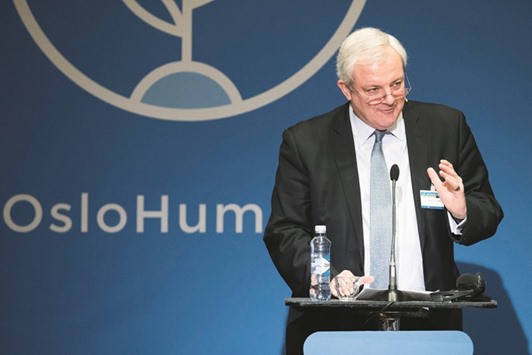Donors have pledged “a third” of the $1.5bn that the UN estimated was needed this year to alleviate the crisis in northeastern Nigeria as well as neighbouring Chad, Niger and Cameroon.
The pledge of $457mn for 2017 was part of $672mn pledged over the three coming years, Norwegian Foreign Minister Borge Brende told a news conference.
Norway hosted the one-day meeting along with Nigeria, Germany and the UN emergency agency OCHA on the crisis engulfing the Lake Chad region.
In addition to raising funds, another aim was to highlight the “truly massive” crisis, said OCHA head Stephen O’Brien.
The UN’s Office for the Co-ordination of Humanitarian Affairs (OCHA) estimated that $1.5bn was needed this year for the four countries, where almost 11mn people are affected, and O’Brien noted that “in one morning we have raised a third of that”.
Brende said 14 countries made pledges.
Others, including the United States, were to announce their contributions later but “humanitarian organisations and the UN could get a lot done now at an early stage”.
The new US administration has said that it intends to slash its development aid budget.
Of the more than 10.7mn people affected, almost a quarter have been forced to flee their homes due to conflict or food shortages.
Attacks are blamed on the Islamist militant group Boko Haram, which for years has terrorised northeastern Nigeria and attacked its neighbours, disrupting trade and local economies, and targeting schools and health clinics.
More than 7mn people are struggling with food insecurity, and over a half million children are severely malnourished.
“Boko Haram’s terror has caused a displacement crisis. Now it has become a severe food and nutrition crisis,” Brende told delegates in the Norwegian capital, Oslo.
Norway pledged 1.6bn kroner ($192mn) for the coming three-year period, of which 729mn kroner was for this year, Brende told delegates.
Sigmar Gabriel, foreign minister of Germany, said his country was contributing €120mn in the coming three years.
“We must not look away, must not turn a blind eye to the suffering in the Lake Chad region,” he said.
The donor host countries said they had agreed to continue to ensure the pledges were acted on.
Nigerian Foreign Minister Geoffrey Onyeama said the crisis was “one of the largest and gravest in the world” and that his government had allocated $1bn to assist millions living in areas affected by Boko Haram’s violence.
Fatima Shehu, of the Nigerian civil society coalition NESCOB in the northeastern state of Borno, reminded delegates that the host communities “are the largest donors”.
“They are the first responders ... if we don’t step up they will all face a life of hunger and famine in some areas of northern Nigeria,” OCHA head O’Brien said.
Ministers from Chad, Cameroon and Niger also underlined the funding urgency, and their commitment to take on Boko Haram.
The presence of Boko Haram militants has prevented farmers from planting crops or accessing Lake Chad to provide water for their animals.
Fishermen have also been prevented from accessing the lake which is shared between Cameroon, Niger, Nigeria and Chad, aid experts say.
Boko Haram militants have killed around 15,000 people and forced more than 2mn from their homes during a seven-year insurgency.
Despite having been pushed out of the vast swathes of territory they controlled in 2014, their attacks and the counter operations by Nigerian authorities still disrupt vital economic activity, officials say.
The most urgent need is to reach 2.8mn people with rice or sorghum, or cash to buy supplies, by July, the UN World Food Programme (WFP) said.
“We are in the lean season and people’s supplies are depleted. We need to avoid a famine,” Abdou Dieng, the WFP’s country director for West and Central Africa, told Reuters.
Christos Stylianides, EU commissioner for humanitarian aid management, said the bloc planned to allocate €105mn to the crisis this year.
In addition to the foreign ministers of the three host countries, ministers from the affected region, and representatives of UN agencies, the African Union as well as donor countries attended.
.

O’Brien: in one morning we have raised a third of (the amount the UN estimates is needed)
